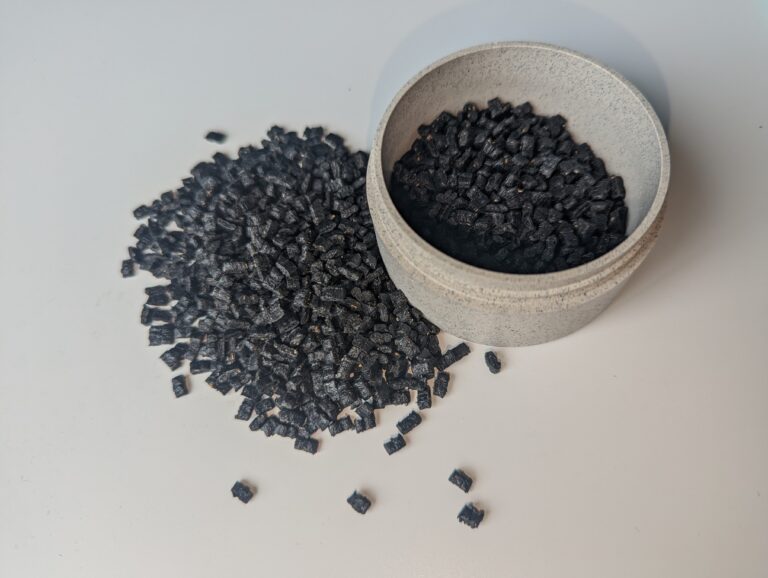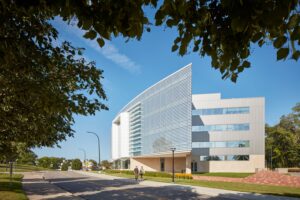
- Kim Kisner
- Business
- 06/25/2024
Heartland, with BASF Funding, Aims to Reduce Carbon Footprint of Plastics

For the last four years, Heartland – a Detroit-based company founded by Tim Almond – has been working to perfect a natural fiber product it calls Imperium that replaces synthetic materials in plastic, helping to reduce the carbon footprint of plastic by up to 50%.
This natural material is hemp fiber, and the company has partnered with farmers in Michigan and across the Midwest to integrate it into their existing crop rotations, which then can increase profits for the farmers, and enhance the soil.
With funding from BASF business incubator Chemovator’s Elevate program, Heartland is commercially producing the product and is ready to deploy it in the reusable packaging industry, followed by the automotive and construction industries.
SBN Detroit talked to Almond about the product and its impact on sustainability.
Q: Tell us about Heartland.
A: Heartland is a material science company based in Detroit that leverages natural fibers to help companies reduce their carbon footprint while solving the challenges of the big three sustainability missions – environment, social, and economic, without compromising product performance.
The fun part is that on the product side, we get to work with the local farming community to increase their revenue per acre and increase soil health as we help manufacturing groups make better products that are better for the environment.
Heartland was born out of a passion for problem-solving and sustainability.
Q: How exactly do you impact and work with the farming community in terms of sustainability?
A: The farming community is going through a very difficult time right now. The two major crops in Michigan, corn and soybean, are seeing a tight income situation because the value of the crops is low but the cost of chemicals and seeds is high. Profit for farmers is all but nonexistent.
Hemp fiber production is a great rotational crop within corn and soybean and drives premium income per acre while improving the soil through micronutrients.
The third most popular crop in Michigan is wheat, and here, we are capitalizing on underutilized land. Typically, this land sits empty from midsummer to spring, but hemp fiber grows quickly so they can grow a crop after the wheat has been harvested. We are seeing organic matter improvements in soil and aeration which lead to better production of future crops. We truly believe hemp fiber could be a staple crop in Michigan and across the U.S.
Q: How many farms in Michigan are involved today?
A: We work with ten or so farms in Michigan and several other states.
Q: What is the process of developing the Imperium product?
A: Hemp fiber is planted densely and grows to be eight to 12 feet tall. It is then cut down and treated so it’s protected from the high temperature of plastic manufacturing. Once it gets in the plastic it looks and functions exactly like plastic.
So essentially the Imperium product line is made from one ingredient – hemp fiber. In the future, there are opportunities to use other natural fibers that could add value to the plastics and rubber used in the manufacturing space.
Q: How do Imperium products mix with plastic to create a better end product?
A: Imperium is not a finished product, it is an ingredient in the final product, being plastic. Much like making a cake,

you use flour, sugar, baking powder, etc. So in making plastic, there are materials added that when combined, make the final product. Today, ingredients such as glass fiber and impact modifiers are used, as are other materials that increase the plastic’s carbon footprint. Imperium replaces large portions of the bad products with natural fiber. We can shave off 30% to 40% of the product’s carbon footprint by swapping some ingredients. It’s like eliminating sugar from your cake recipe but still enjoying the sweet flavor.
Q: How did your team achieve the development of and engineering behind the products?
A: A lot of failure. Trial and error. It took time to figure out what works. In many cases, the fact that we did not have the proper resources and funding gave us time and space to get it right. If we had funding three years ago, we probably would have purchased the wrong equipment.
So we had to be creative with our processes, and we finally landed on a method that works with extreme efficiency.
Q: Where are products deployed commercially and in what industries?
A: We are commercially able to produce master batch technology for three areas of the marketplace – automotive, construction, and reusable packaging.
For the auto market, think exterior components, car handles, and roof racks.
Reusable packaging is our bread and butter. This consists of bins, totes, and pallets – things used to move materials in a warehouse.
We are working with about 100 groups on the product development now. In the reusable packaging space, we are in the final stages of integrating into their commercial lines. These lines move hundreds of millions of pounds so it’s a meticulous process to implement.
The auto industry involves a three to five-year lifecycle, but we do have an opportunity for next year’s product model. This is undefined as of today though.
In the construction industry, we are in the middle stages of creating opportunities.
Q: What global brands are you working with?
A: Some are confidential at this time. But we work heavily with BASF and their Ultramid B Nylon 6 product, which is on every vehicle in the world. There is an opportunity for tremendous growth.
Q: Creating partnerships with larger companies appears to be one strategy that you have. How does that work and do companies have equity stakes?
A: In the chemical marketplace there are producers and processors who work with distributors as partners to expand sales capacity. We are taking a similar approach in that regard.
Q: How is Heartland supported by BASF Chemovator?
A: The investment came from Chemovator which is BASF’s incubation and seed funding arm, and with their venture capital investments
They saw long-term synergy between Heartland and their main business unit – the nylon division – so it made sense for their corporate investment arm to take a deeper look at Heartland, and when they did, they invested.
Be sure to subscribe to our newsletter for regular updates on sustainable business practices in and around Detroit.
Kim Kisner
- All
- Business
- Community
- Education
- Events

ZF Group, a global technology company with its North American headquarters in Northville, specializes in systems for passenger cars, commercial vehicles, and industrial technology. With a focus on next-generation mobility, the company develops solutions that address electrification, automation, and digitalization while aiming to improve safety, efficiency, and sustainability in transportation. SBN Detroit interviewed Anuj Shah, Sustainability Lead, for the Americas, to explore the most pressing environmental challenges in...

The Chip Bag Project, based in Detroit, is a sustainability initiative that upcycles hard-to-recycle snack packaging — particularly chip bags — into insulated sleeping bags for individuals experiencing homelessness. Founded by Eradajere Oleita, the project addresses both environmental waste and housing insecurity by transforming materials like Mylar into practical, thermally efficient solutions. In June, Oleita was among Trelllis’s 30 Under 30, its annual recognition of the brightest young...

PowerPanel, headquartered in Oxford, focuses on sustainable energy technology with a particular emphasis on hot water systems and thermal energy capture. The company designs and manufactures modular solar hybrid systems that integrate both photovoltaic and thermal components into a single unit. Its goal is to offer energy solutions that are more efficient, durable, and economically viable for a range of commercial and industrial applications. SBN Detroit interviewed Garth...







